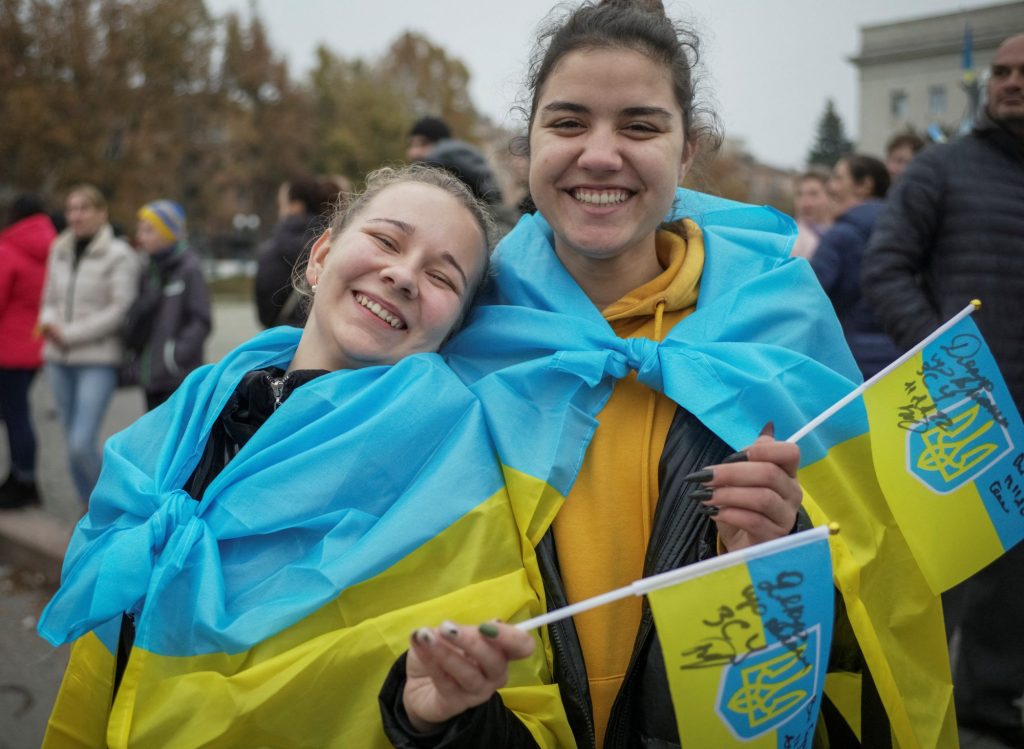
Last week’s liberation of Kherson produced some of the most iconic scenes since the beginning of the Russian invasion. The arrival of Ukrainian troops in the city sparked wild celebrations from a civilian population brutalized by eight months of Russian occupation. “This is what liberation looks like. This is what liberation feels like,” commented CNN’s Nic Robertson in one of many memorable reports from the city. Sky News correspondent Alex Rossi described the atmosphere as “euphoric” as he was mobbed by joyous locals cheering Russia’s retreat.
Despite harsh conditions and a lack of basic amenities in Kherson, the party began almost as soon as news of the Russian military withdrawal was confirmed. Speaking to AFP, one Kherson resident summed up the mood in the liberated city. “We have no electricity, no water, no heating, no mobile or internet connection. But we have no Russians! I am extremely happy. We can survive anything but we are free.”
This footage should be compulsory viewing for anyone who still believes in the possibility of a negotiated settlement with Putin’s Russia. Despite overwhelming evidence of the Kremlin’s genocidal agenda in Ukraine, opinion pieces continue to appear with depressing regularity in the international media arguing that the time has come for Ukraine’s Western partners to pressure the country into peace talks.
The authors of such articles typically acknowledge Russia’s criminality before emphasizing the alleged inevitability of compromise. The wave of emotion that swept Kherson following the city’s liberation is a timely reminder for advocates of appeasement that compromising with the Kremlin actually means condemning millions of Ukrainians to the horrors of Russian occupation.
At this point, it is no longer possible for any honest observer to deny knowledge of Russian war crimes in occupied Ukraine. In every single liberated region of the country, Ukrainian forces have encountered the same grim revelations of mass graves and torture chambers along with accounts of abductions, executions, sexual violence, and forced deportations involving millions of victims.
Meanwhile, the methodical Russian bombardment of cities such as Mariupol is believed to have killed tens of thousands of Ukrainian civilians. Attempts to document these atrocities are still at an early stage, but United Nations inspectors have already confirmed that Russia has committed war crimes against the Ukrainian civilian population.
Russian occupation forces have also made no secret of their desire to eradicate all traces of Ukrainian national identity. Wherever the Kremlin has established control, the Ukrainian language has been suppressed and the Ukrainian currency phased out. Access to Ukrainian media has been blocked. Teachers have been brought in from Russia to indoctrinate Ukrainian schoolchildren. At the same time, Kremlin officials and regime propagandists have explicitly declared their intention to extinguish Ukrainian statehood and proclaimed their genocidal denial of Ukraine’s right to exist. This is the ghoulish reality that so-called foreign policy realists believe Ukraine must be made to accept.
Russia currently occupies around 20% of Ukraine. Any peace agreement reached in the near future would inevitably involve ceding some or all of this territory to Moscow for an indefinite period. Millions of Ukrainians would then face a desperate future. Many would make the agonizing choice to flee their homes for free Ukraine, leaving behind their former lives and worldly possessions. Those who remained would be forced to adopt a Russian imperial identity or risk savage repression if they continued to resist.
Despite the risks involved, resistance would likely continue. The outpouring of emotion in liberated Kherson highlighted the strength of Ukrainian national feeling in occupied areas of the country and made a mockery of the idea that Moscow enjoys the support of the local population. Just weeks before Putin’s troops retreated from Kherson, the Kremlin claimed 87% of residents had voted in favor of joining Russia. The widespread public jubilation that greeted Russia’s withdrawal vividly illustrated the absurdity of that figure.
Nor is it clear exactly what everyone is so afraid of. Ukraine has already shattered the myth of Russia’s military invincibility and has successfully liberated more than half the territory occupied since the invasion began nearly nine months ago. Putin’s once vaunted army is demoralized and decimated, while the Russian dictator himself is an international pariah. His energy weapon has been partially disarmed and he has recently been forced to distance himself from earlier attempts at nuclear blackmail following rebukes from China and stern warnings from the United States. It makes no strategic sense whatsoever to offer Putin a face-saving peace deal at this point.
For now, there is little public indication that Western leaders are listening to calls for a return to negotiations. Instead, they remain insistent that any decision to resume diplomatic efforts can only be made by Ukraine. However, as the war drags on and the economic costs for Ukraine’s partners continue to mount, the voices currently pushing for Ukrainian concessions will grow louder.
As the war enters a potentially decisive period, it is vital to keep in mind that any compromise would come with crippling costs. For Ukraine, it would mean betraying and abandoning millions of citizens. For Western leaders, it would mean empowering Putin while sacrificing the foundational values of the democratic world. The problems posed by an aggressive and revisionist Russia would be unresolved, but the West’s position would be significantly weaker.
Nobody wants peace more than the Ukrainians themselves. Their country has been devastated by Russia’s invasion and their population left deeply traumatized. Thousands have been killed and millions have been forced to flee. Nevertheless, Ukrainians also understand that Putin must be defeated before peace can return to Europe. All they ask for is the continued support of their international partners. One way to demonstrate this support is by ending unhelpful appeals for a premature peace.
No comments:
Post a Comment